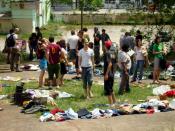Csikszentmihalyi (1992) formulated the following idea:"Why is it that despite having achieved previously undreamed miracles of progress we seem more helpless in facing life than our less than privileged ancestors? The answer seems clear: while humankind collectively has increased its material powers a thousand fold, it has not advanced very far in terms of improving the content"The Professor Kahneman supports this opinion when saying that "standard of living has increased dramatically and happiness has increased not at all" (Rudin, 2006, BBC News). Rudin (2006) affirms that despite the huge increase in wealth from the nineteen 50s, levels of happiness have not increased, so being richer is not making people happier.
According to Rudin (2006) richer countries tend to be happier than the poor ones, but once basic needs of life -food, home and clothes- are gotten, extra money does not make people much happier.
Additionally, Wilkinson (1996) claims that healthy and egalitarian societies have more social cohesion, which is a fundamental fact to get a generalised quality of life for all people, leading to happier societies and individuals.
Wilkinson (1996) continues stating that this kind of societies have a more harmonious community life and suffer fewer of the negative effects of inequality. The public field becomes a source of cooperative social networks instead of a source of stress and potential conflict. So more egalitarian societies also can contribute to avoid the trend to compare us against others and as Rudin (2006) affirms, to avoid poorer people compare themselves against richer people, as this trend makes poorer people less happy. On the other hand, increased inequality imposes a psychological anxiety that reduces the wellbeing of the society and consequently the happiness of the individuals of that society (Wilkinson, 1996). This can be noted on countries where some of the inhabitants go...


